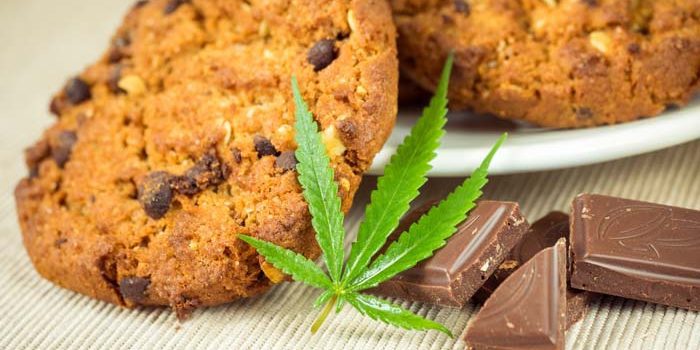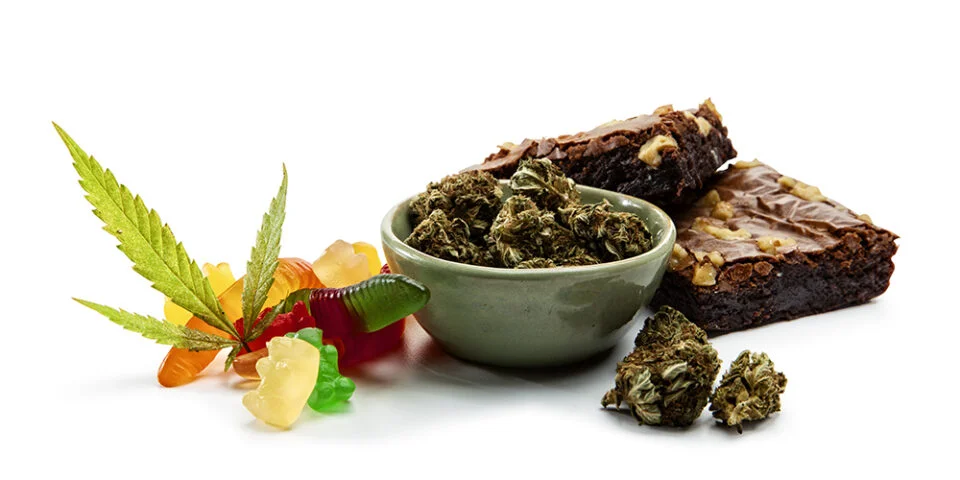Currently Empty: $0.00

What Are Cannabis Edibles?
Cannabis Edibles are food products infused with cannabis. These can range from sweet treats like brownies, cookies, and gummies to savory snacks and beverages. Unlike smoking or vaping cannabis, edibles offer a smoke-free alternative to consuming marijuana, making them an appealing choice for many.
Different Types of Edibles
The world of edibles extends far beyond the classic pot brownie. Today, you can find a wide array of edible products, each with its own unique characteristics:
Baked Goods: This includes items like brownies, cookies, cakes, and other baked treats.
Gummies and Candies: Chewy, flavorful edibles that often mimic the appearance of regular gummies and candies. Candies like devour sour belts 3000mg, chuckles edibles are a perfect start to try.
Drinks: Cannabis-infused teas, juices, sodas, and even coffee drinks.
Tinctures and Oils: Liquid forms of cannabis that can be taken sublingually (under the tongue) or added to food and drinks.
Savory Snacks: Edibles like crackers, chips, and even infused nuts and popcorn.
Edibles offer a discreet and convenient way to consume cannabis, making them popular among medical and recreational users alike. Some of the key benefits and effects of edibles include:
Health Benefits Of Edibles in 2024
Medical Use: Edibles are often used by medical cannabis patients to manage pain, inflammation, anxiety, and insomnia. They offer a longer-lasting effect compared to smoking, which can be beneficial for chronic conditions.
Recreational Use: For recreational users, edibles provide a discreet and convenient way to enjoy cannabis. They are ideal for social settings or situations where smoking is not possible or appropriate.
Lung health: By avoiding smoke inhalation, edibles are gentler on the respiratory system.
Longer-lasting effects: The effects of edibles typically last longer than smoking, providing extended relief for medical users.
Precise dosing: Dispensary-bought edibles offer clearly labeled THC content, allowing for more accurate dosing.
Discreet consumption: Edibles can be consumed inconspicuously, making them ideal for those who prefer privacy.
Potential Side Effects of Cannabis Edibles
While edibles can offer various benefits, it’s crucial to be aware of potential side effects:
Overconsumption risk: Due to delayed onset, users might consume more than intended, leading to intense and prolonged effects.
Cognitive impairment: THC can affect memory, concentration, and reaction time. This impairment can last longer with edibles compared to smoking.
Anxiety and paranoia: High doses of THC can trigger anxiety or paranoid thoughts in some individuals, especially those new to cannabis.
Dry mouth and eyes: Cannabis often causes cottonmouth and red, dry eyes.
Dizziness and nausea: Some users may experience vertigo or nausea, particularly with higher doses.
Increased heart rate: THC can cause temporary tachycardia, which may be concerning for those with heart conditions.
Drowsiness and fatigue: Edibles, especially those with indica strains, can cause significant drowsiness.
Interactions with medications: Cannabis can interact with various medications, potentially altering their effectiveness.
Gastrointestinal discomfort: Some users may experience stomach upset, especially with sugar-heavy edibles.
Dependency risk: Regular, heavy use of cannabis can lead to psychological dependence in some individuals.
Impaired motor skills: THC can affect coordination and balance, increasing the risk of accidents.
Mood changes: While cannabis can improve mood for some, it may cause irritability or mood swings in others.

It’s important to note that the severity and likelihood of these side effects often depend on factors such as dosage, individual tolerance, and the specific product used. Beginners should start with low doses and be in a safe, comfortable environment when trying edibles. If any severe or persistent side effects occur, it’s advisable to seek medical attention.
Remember, everyone reacts differently to cannabis. What works well for one person may not be suitable for another. Always prioritize safety and consult with a healthcare professional if you have any concerns or pre-existing health conditions.
Which Edibles Make You High?
Any edible containing THC (tetrahydrocannabinol) will cause psychoactive effects or a “high.” The intensity of the high depends on the THC content and your tolerance level. Edibles labeled with CBD (cannabidiol) are less likely to produce a high as CBD is non-psychoactive and often used for its therapeutic benefits.
How Long Does It Take for Edibles to Kick In?
One of the most common questions about edibles is, “How long does it take for them to kick in?” The answer is not a simple one, as it can vary greatly depending on several factors:
Understanding the Onset Time: The onset time for edibles can vary widely based on several factors, including metabolism, body weight, and the type of edible consumed. Generally, edibles take longer to kick in compared to smoking or vaping because they must first be digested and metabolized by the liver.
Typical Onset Times:
Gummies and Candies: These usually take 30 minutes to 2 hours to kick in.
Baked Goods: Expect these to start working within 45 minutes to 3 hours.
Beverages: These can be quicker, kicking in anywhere from 15 minutes to 2 hours.
Factors Influencing Onset Time
Metabolism: Individuals with faster metabolisms will feel the effects sooner than those with slower metabolisms.
Empty vs. Full Stomach: Consuming edibles on an empty stomach can lead to quicker onset times, while a full stomach may delay the effects.
Type of Edible: The form of the edible affects how quickly it is absorbed. Liquids and gummies are generally faster than baked goods.
Tips for Consuming Edibles
Start Low, Go Slow: Begin with a low dose (5-10mg of THC) and wait at least 2 hours before consuming more. This helps avoid overconsumption and potential discomfort.
Be Patient: Don’t make the mistake of thinking it’s not working and consuming more. Give it time.
Stay Hydrated: Drink plenty of water to help manage any side effects.
Choose a Comfortable Setting: Especially for first-time users, consuming edibles in a familiar and relaxing environment can enhance the experience.
In general, edibles can take anywhere from 30 minutes to 2 hours to begin taking effect, with the peak high occurring around 2-4 hours after consumption. However, it’s important to be patient and not consume additional edibles too quickly, as the effects can be long-lasting and unpredictable. Edibles offer a versatile and convenient way to consume cannabis, with a variety of options to suit different preferences and needs.
Whether for medical or recreational use, understanding the different types of edibles and how long they take to kick in can enhance your experience and ensure safe consumption. Always remember to start with a low dose and be patient, as the effects can take some time to appear but will last much longer than other methods of consumption.

